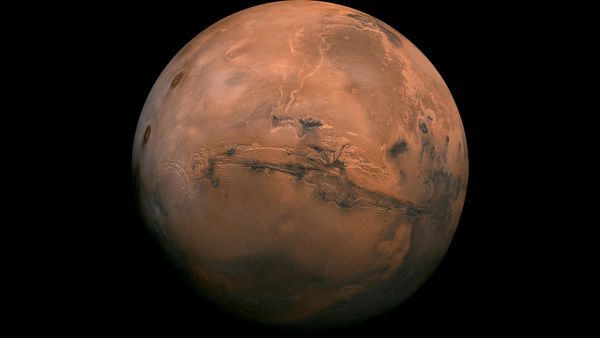
By Elon Musk's calculations, humans could be hurtling toward Mars in less than a decade. On Sept. 27, the SpaceX CEO announced the development of a mass-transit rocket system, a fleet of ships that will carry passengers and cargo to and from the planet every 26 months, when Earth and Mars are closest. And he says the first crew of 100 could be on Mars as early as 2022.
It would be a first step toward establishing a human colony on Mars, a process that will take a very, very long time if it turns out humans can't reproduce there.
Advertisement
Scientists aren't sure what would happen if a human were to try to get pregnant, gestate a fetus or raise a developing human being on a planet with one-third the gravity and 100 times the surface radiation of Earth. It's unclear, writes Brandon Keim on Wired, whether "[c]ellular processes that evolved for Earth-specific physics" will work properly in that type of environment.
Of course, Hollywood's willing to speculate on how the whole having-a-baby-in-space gambit might work out.
Space Is No Place for Babies
Cinematics aside, what we do know about mammalian reproduction beyond Earth isn't encouraging. In 1979, five female and two male rats went up in the Russian satellite Cosmos-1129, and while two of the rats got pregnant, both pregnancies were "resorbed." In 2009, biologists bred rats in simulated microgravity, and the rats' embryonic cells didn't divide and mature properly. Similar studies found that fetal rats in microgravity experienced abnormal skeletal and brain development, adult males' developed low sperm counts and shrunken testes, and females' ovaries shut down.
Scientists express concern that low gravity also could increase the risk of ectopic pregnancy.
Sadly, space radiation poses fewer unknowns regarding human conception and development (thus the "Are you or could you possibly be pregnant" before a woman gets an X-ray). Radiation can interfere with cellular processes and damage DNA. It can wreak havoc on sperm count. And that's at medical doses.
Earth's atmosphere stops most space radiation from reaching the surface of the planet. The Martian atmosphere does not. Current radiation-shielding technology can't offset that.
Dr. John P. Millis, assistant professor of physics and astronomy at Anderson University in Indiana, writes on About Education that even if fertilization were to find a way despite a reduced sperm count, the Martian radiation environment is "severe enough that it would prevent cells in the fetus from replicating, and the pregnancy would end."
Which might be the best possible outcome of a space-based pregnancy. The effects of ionizing radiation, the most common and abundant form of radiation in space, on an embryo or fetus are potentially catastrophic. The Centers for Disease Control and Prevention lists growth retardation, malformations, impaired brain function and cancer, "even at radiation doses too low to immediately affect the mother."
To top things off, sex itself might induce motion sickness, contraception might not work, and reduced gravity might prevent erections.
No Sex on the Settlement
Mars One, a SpaceX competitor planning to send a crew to Mars around 2026, says it will advise early settlers against trying to get pregnant. The early Mars settlement won't be a suitable environment for children, the company explains on its web site, and the "human ability to conceive in reduced gravity is not known, neither is there enough research on whether a fetus can grow normally under these circumstances."
That may translate to abstinence, given questions about contraception efficacy. According to Salon's Chris Impey, some have raised the possibility of voluntary sterilization for Mars explorers.
If Musk is thinking about space sex, he's not talking about it.
Neither is NASA. When asked to comment on the subject, a NASA representative responded via email, "Our plan identifies the human factor challenges to staying healthy ... that the agency is addressing, which do not include the topic of human reproduction."
NASA plans to send humans to Mars by the end of the 2030s. No word on which agency is addressing the topic of human reproduction.
Advertisement
